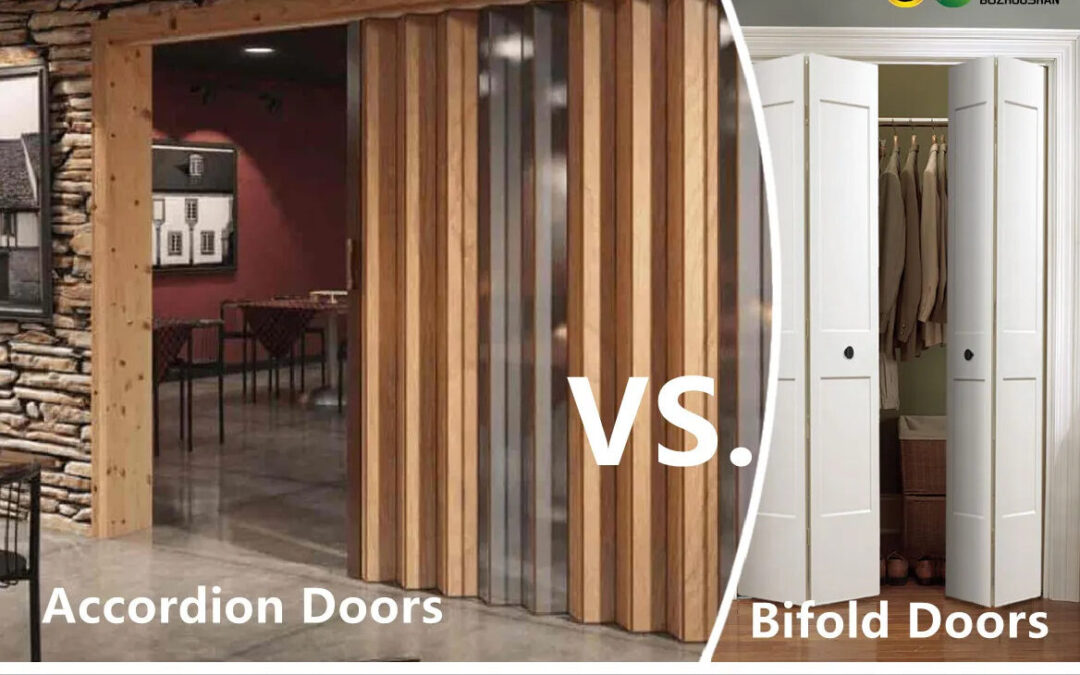When it comes to maximizing space and creating a seamless transition between rooms, folding doors, and accordion doors emerge as versatile and stylish solutions. Both offer a unique set of features, yet they differ in design and functionality. In this article, we’ll explore the characteristics, benefits, and considerations of folding doors and accordion doors to help you make an informed decision for your living spaces.
Folding Doors: A Space-Efficient Marvel:
Folding doors, also known as bi-fold doors, are a popular choice for those seeking a space-efficient solution. These doors consist of multiple panels connected by hinges that fold in a concertina style when opened. The result is a neatly stacked arrangement that maximizes the available space, making them an excellent choice for smaller rooms or spaces with limited floor area.
Accordion Doors: Flexible and Adaptable:
Accordion doors, as the name suggests, fold similarly to an accordion or zigzag pattern. Unlike folding doors, accordion doors typically have a continuous hinge that allows them to fold back on themselves in a smooth, flowing motion. This design provides flexibility in terms of how much of the door can be opened, allowing for partial openings or complete closure, depending on the desired level of privacy and airflow.
Space Optimization:
Both folding doors and accordion doors excel in space optimization, making them ideal for areas where traditional swinging doors might be impractical. Folding doors, with their neatly stacked panels, are particularly efficient in maximizing the available space, while accordion doors offer the flexibility of adjusting the opening to suit specific needs.
Design and Aesthetics:
In terms of aesthetics, both folding doors and accordion doors offer a sleek and modern appearance. Folding doors create a visually appealing geometric pattern when closed, with the panels neatly aligned. Accordion doors, on the other hand, provide a continuous and flowing look, adding a touch of elegance to the space. The choice between the two often comes down to personal preference and the desired design aesthetic for the room.
Versatility in Material Options:
Both types of doors are available in a variety of materials, providing homeowners with options to suit their preferences and the overall design of their homes. Common materials include wood, aluminum, vinyl, and glass. The versatility in material options allows for customization, ensuring that the doors seamlessly integrate with the existing decor.
Indoor-Outdoor Living:
Folding doors are particularly popular for creating a seamless indoor-outdoor living experience. When fully opened, they can transform an entire wall into an expansive opening, connecting the interior space with the outdoors. Accordion doors also excel in this regard, offering the flexibility to partially open the doors for a gentle breeze or fully open them to merge indoor and outdoor spaces.
Installation Considerations:
The installation process for both folding doors and accordion doors requires careful consideration. Professional installation is recommended to ensure that the doors operate smoothly, align properly, and provide a secure closure. Attention to detail such as track alignment and panel adjustments is crucial for the long-term performance of the doors.
Maintenance Requirements:
Maintenance for both types of doors is relatively straightforward. Regular cleaning of tracks and hinges, along with occasional lubrication, ensures smooth operation. Additionally, homeowners should inspect the hardware for any signs of wear or damage and address issues promptly. Routine maintenance contributes to the longevity and optimal functionality of the doors.
Sound Insulation and Privacy:
While both folding doors and accordion doors provide a degree of sound insulation and privacy, there may be variations in performance based on the design and materials used. Homeowners seeking enhanced soundproofing should consider the thickness of the door panels and the use of weatherstripping. Additionally, the choice of materials, such as solid wood, can contribute to improved sound insulation.
Cost Considerations:
The cost of folding doors and accordion doors can vary based on factors such as materials, size, and customization. Generally, accordion doors may have a slightly higher cost due to their continuous hinge design and the flexibility they offer. Homeowners should weigh the benefits and features against their budget to determine the most suitable option for their needs.
Considerations for Weather Exposure:
In spaces where doors may be exposed to the elements, such as in outdoor living areas, it’s essential to choose materials that can withstand weather conditions. Aluminum and vinyl are popular choices for their durability and resistance to corrosion. Proper weatherstripping and insulation are crucial for maintaining a comfortable indoor environment, especially in extreme climates.
Conclusion:
In the debate between folding doors and accordion doors, the right choice ultimately depends on the specific needs and preferences of the homeowner. Folding doors excel in maximizing space efficiency, particularly in smaller rooms or areas with limited space. Accordion doors offer flexibility in adjusting the opening, making them suitable for various privacy and airflow requirements. By considering factors such as space availability, design preferences, and budget constraints, homeowners can make an informed decision to enhance the functionality and aesthetics of their living spaces.

